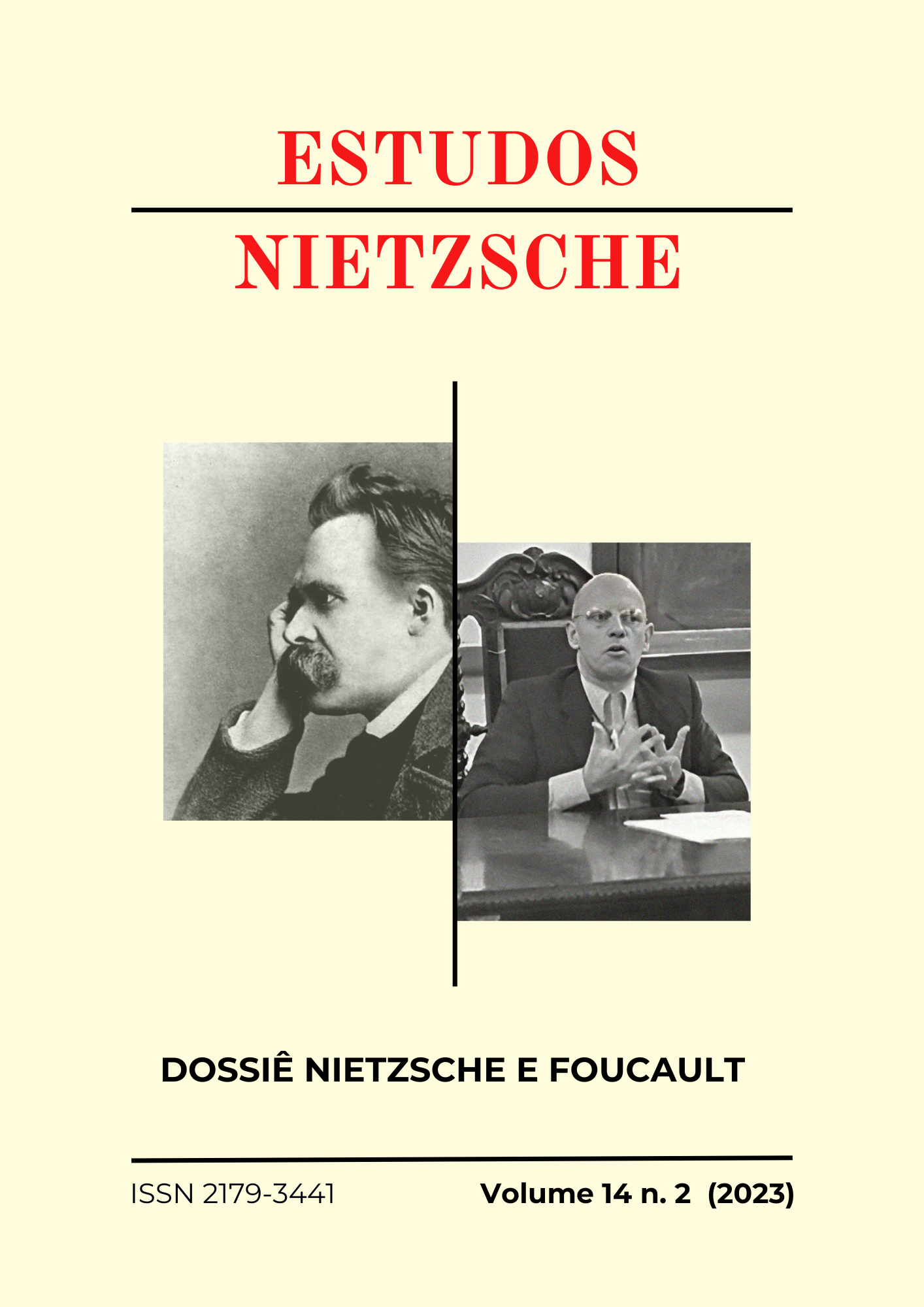Como se pensar em uma postura ativa em relação ao ressentimento
DOI:
https://doi.org/10.47456/en.v14i2.41537Palabras clave:
Nietzsche, Ressentimento, RancorResumen
Este artigo tem como objetivo imaginar a possibilidade de uma resposta ativa para o afeto do ressentimento, tendo como fundo do seu desenvolvimento o pensamento de Friedrich Nietzsche, que é considerado um dos seus principais investigadores. Para tal, o texto começa mostrando como esse afeto acompanha a humanidade desde, ao menos, os gregos na Antiguidade, fazendo um resgate de menções ao tema vindas ainda de Homero e Aristóteles. Logo a seguir, chegamos especificamente a Nietzsche para situar, com o auxílio da
Genealogia da moral, o ressentimento como a dificuldade de digerir ou responder à altura uma agressão sofrida. No passo seguinte, mostramos alguns desenvolvimentos dos estudos sobre o tema, como uma leitura psicanalítica e o desenvolvido pela cientista política Wendy Brown. Brown associa o ressentimento à recente ascensão da extrema-direita, mas veremos como o afeto também aparece em grupos de esquerda. A partir daí, depois de concluirmos que tal afeto é universal, o artigo começa a proposta de se pensar, por meio da transvaloração dos valores, uma postura ativa em relação ao ressentimento. Depois dessa explicação, para exemplificar o caso, o texto chega a Machado de Assis, com a ajuda do crítico Roberto Schwarz, e sua teoria sobre agregados e o favor, para mostrar como Machado foi um dos escritores brasileiros que melhor explorou, mesmo que indiretamente, todo o ressentimento que compunha a sociedade brasileira no século XIX.
Referencias
ARISTÓTELES. Retórica. Tradução, textos adicionais e notas Edson Bini. São Paulo: Edipro, 2019.
____. Retórica das paixões. Prefácio de Michel Meyer. Introdução, notas e tradução do grego: Isis Borges B. da Fonseca. São Paulo: Martins Fontes, 2000.
ASSIS, Machado de. Obra Completa de Machado de Assis. Rio de Janeiro: Nova Aguilar, 1994. Disponível em: https://machado.mec.gov.br/index.php.
BILATE, Danilo. Nietzsche e uma ética dos afetos. Orientador: André Martins Vilar de Carvalho. Coorientador: Bertrand Binoche. 226 folhas; Tese (Doutorado em Filosofia) -Universidade Federal do Rio de Janeiro em cotutela com a Université de Paris I Panthéon-Sorbonne, Rio de Janeiro, 2012.
BROWN, Wendy. In the Ruins of Neoliberalism - The rise of antidemocratic politics in the west. Nova York: Columbia University Press, 2019a.
____. Nas ruínas do neoliberalismo. A ascensão da política antidemocrática no ocidente. Traduzido por Mario Antunes Marino e Eduardo Altheman C. Santos. São Paulo: Editora Filosófica Politeia, 2019b.
____. States of Injury. Power and freedom in late modernity. Nova Jersey: Princeton University Press, 1995.
DELEUZE, Gilles. Nietzsche e a filosofia. Tradução: Mariana de Toledo Barbosa e Ovídio de Abreu Filho. São Paulo: N-1, 2018.
____. Espinosa. Filosofia prática. Tradução: Daniel Lins e Fabien Pascal Lins. São Paulo: Escuta, 2002.
ELGAT, Guy. Nietzsche’s Psychology of Ressentiment Revenge and Justice in On the Genealogy of Morals. Londres e Nova York: Routledge, 2017.
FLEURY, Cynthia. Ci-gît l’amer - guérir du ressentiment. Paris: Gallimard, 2020. (E-book).
GIACOIA JUNIOR, Oswaldo. Ressentimento e vontade – para uma fisio-psicologia do ressentimento em Nietzsche. Rio de Janeiro: Via Vérita, 2021.
HOMERO. Ilíada. Tradução: Frederico Lourenço. São Paulo: Penguin Companhia, 2013.
KEHL, Maria Rita. Ressentimento. São Paulo: Boitempo, 2020.
MARTON, Scarlett. Das forças cósmicas aos valores humanos. São Paulo: Editora Brasiliense, 1990.
NIETZSCHE, Friedrich. Além do bem e do mal. Tradução Paulo César de Souza. São Paulo: Companhia das Letras, 2005.
____. Genealogia da moral. Tradução: Paulo César Souza. São Paulo: Companhia de Bolso, 2018.
____. “O niilismo europeu”. Tradução de Noéli Correia de Melo Sobrinho, in Comum. Rio de Janeiro, v.8. nº 21. p. 5-23, Jul/Dez 2003.
____. “Der europäische Nihilismus”. In: Nachgelassene Fragmente Sommer 1886 — Herbst 1887. 1887. Disponível em: http://www.nietzschesource.org/#eKGWB/NF-1886,5[71].
NUNES, Rodrigo. Do Transe à vertigem - Ensaios sobre bolsonarismo e um mundo em transição. São Paulo: UBU, 2022.
PASCHOAL, Antonio Edmilson. “Niilismo e ressentimento na terceira dissertação da genealogia da moral”, in Sofia, Vol. 8, n. 2. Disponível em: https://periodicos.ufes.br/sofia/article/view/28563. Acesso em: 19 jul. 2021.
____. “O perdão como sinal de força e saúde”. In: BARRENECHEA, M. A. de (Org.). As dobras da memória. RJ: 7Letras, 2008.
SCHWARZ, Roberto. “As ideias fora do lugar”. In: Ao vencedor as batatas. São Paulo: Ed. 34, 2000
VAN TUINEN, Sjoerd (org.). The Polemics of Ressentiment - Variations on Nietzsche. Londres: Bloomsbury Publishing Plc, 2018.
Descargas
Publicado
Número
Sección
Licencia
Derechos de autor 2024 ronaldo pelli

Esta obra está bajo una licencia internacional Creative Commons Atribución 4.0.
Ao submeter o artigo, resenha ou tradução para a Estudos Nietzsche, o autor cede à revista o direito à primeira publicação do texto, mantendo, contudo, o direito de reutilizar o material publicado, por exemplo, em futuras coletâneas de sua obra.






